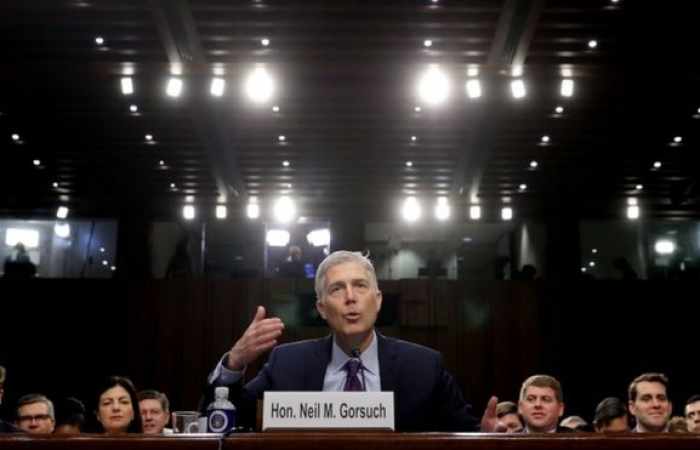He said he would have "walked out" if Mr Trump had asked him to overturn the landmark Roe v Wade abortion ruling.
But he said it would be wrong to say how he would rule on any given case.
That would be the "beginning of the end" of an independent judiciary, he said.
Mr Gorsuch, nominated for the seat vacated by the death of Justice Antonin Scalia 13 months ago, is facing two days of intense grilling in the Senate Judicial Committee.
The first question on Tuesday, from chairman Chuck Grassley, asked if he would have "any trouble ruling against a president who appointed you".
Mr Gorsuch said: "I have no difficulty ruling against, or for, any party, other than based on what the law and facts in the particular case require.
"There's no such thing as a Republican judge or a Democratic judge. We just have judges in this country."
Insisting on the separation of powers between the judiciary and the legislature, he said: "Judges would make pretty rotten legislators - we are life tenured, you can't get rid of us, it would be a pretty poor way to run a democracy."
He was later asked directly if he was a surrogate for President Trump and replied: "No."
Mr Gorsuch said on several occasions "no-one is above the law", including when asked whether Mr Trump could be prosecuted if he reinstated illegal interrogation techniques such as the now-banned water-boarding. Mr Trump has in the past backed the process and vowed during his election campaign to "bring back a hell of a lot worse".
Ranking Democrat Dianne Feinstein spent her 30 minutes touching on three areas Mr Gorsuch will continue to be pressed on - abortion, gun control and employee rights.
Ms Feinstein asked whether the landmark 1973 ruling Roe v Wade, which legalised abortion, should be protected as a "super precedent" - a ruling so ingrained in law it is hard to overturn.
Mr Gorsuch acknowledged the case was a reaffirmed precedent, but added: "I'm not in a position to tell you whether I personally like or dislike a precedent. That's not relevant to my job."
Mr Gorsuch told Senator Lindsey Graham that he had not met Mr Trump before his interview for the post.
Mr Graham asked if Mr Trump had called on him in the interview to overturn Roe v Wade. Mr Gorsuch said "No", and that if he had done so, "I would have walked out of the door."
On employee rights, Democrats have targeted Mr Gorsuch's dissenting opinion supporting a transportation firm that sacked a driver for defying an order to stay in a freezing, broken-down lorry.
Mr Gorsuch said that in 2,700 opinions he had given, he had often ruled "for the little guy instead of the big guy".
He was also asked about Mr Trump's travel ban on people from six mainly Muslim nations, saying again that no-one could know how he would rule.
Reminded of one congressman who said it would be good to have him on the court to back the ban, Mr Gorsuch said: "A lot of people say a lot of silly things."
The hearing began on Monday with angry exchanges among Democrats and Republicans over why former President Barack Obama's choice for the post, Merrick Garland, had not been given a hearing last year.
Limited options
It remains unclear whether Democrats will try to block Mr Gorsuch's confirmation.
If they do, their options are limited.
Republicans control the Senate and they can change the chamber's rules to make it easier to confirm Mr Gorsuch if any attempt is made to block him.
They hope to have Judge Gorsuch, currently a judge on the Denver-based 10th US Circuit Court of Appeals, confirmed before Congress leaves for recess on 7 April.
More about: #Trump
















































